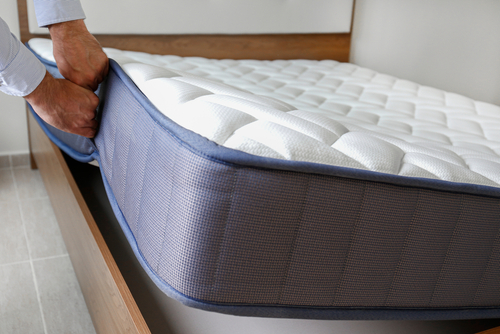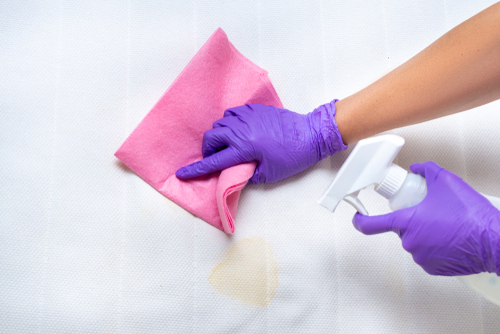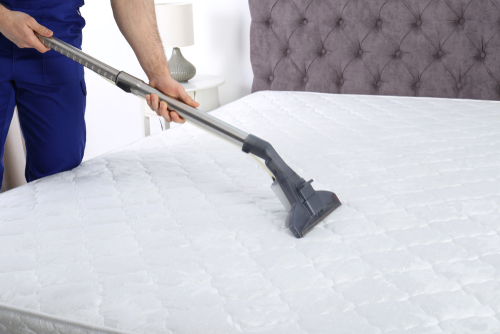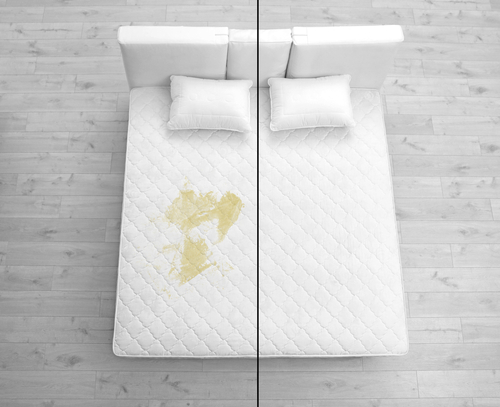What’s in this guide?
How often should you clean your mattress?

Generally, mattresses should be deep cleaned once or twice each year. It also wouldn’t hurt to regularly vacuum the mattress each week (or whenever you change your bedsheets). Although you might need to schedule a deep clean more frequently if you have asthma or sensitivities to allergens such as dust mites.
If your mattress shows mould, stains or smells that won’t budge after cleaning, then it may be time to replace it. Keep in mind that you should also switch mattresses approximately every seven years, although high-quality mattresses can last a little longer than 10 years.
5 signs your mattress needs to be cleaned

The monsters hiding on your bed aren’t always easy to see ─ we’re talking different kinds of dust mite poop, dander (microscopic flakes of skin from pets), fungi and a lot of dead skin. If you’re noticing some of the signs mentioned below despite washing your sheets each week, it may be worth giving your mattress a deep clean.
Several things to look out for include:
- Stains or spots on your mattress
- Odd or musty smells coming from your mattress
- Mould or mildew in the room
- If you’re experiencing more allergy-like symptoms, such as hay fever and itchy eyes, or have more difficulty breathing (if you have asthma)
- If you develop hives or see skin conditions such as dermatitis and eczema flare-up.
What’s the best way to deep clean a mattress?

Regularly changing your bedsheets isn’t enough to get rid of the gunk snuggling up on your bed. But before you start deep cleaning, make sure to read the care instructions for your mattress as well as for any other products you’re using (i.e. disinfectant sprays). Here’s how to remove stains, dirt, bad smells and any odd crumbs or strands of hair that made their way under the sheets:
- Strip all the bedding off, such as pillows, blankets, mattress toppers and the mattress zip cover (if any). Give these a wash to prevent bringing any old bacteria back into bed.
- Vacuum all sides of the mattress, preferably with an upholstery attachment or any other brush head designed to clean mattresses.
- Spot clean stains by lightly spraying stain remover or by applying a mild detergent and a small amount of water on a cloth, using as little water as possible (but enough to dampen the cloth and create a foamy consistency). Don’t let any water leak into the mattress because this is what can cause mould.
- Gently rub the homemade stain cleaning solution into the mattress in a circular motion, starting from the outside and work your way in. Let it dry.
- As an optional step, you can lightly spray a mattress-friendly antibacterial disinfectant all over the mattress. Wipe down with warm water and wait for it to dry. Again, avoid soaking the bed and don’t use products containing bleach or ammonia.
- Deodorise the mattress by sprinkling a generous amount of baking soda on top of the mattress. Leave it for one hour, before vacuuming the mattress for a second time.
- Make the bed.
It’s a good idea to also open all the windows and doors to get rid of stale air and encourage fresh airflow. This helps to prevent mould or mildew from growing as a result of any moisture or humidity in the room.
There’s even some suggestion from brands like Ecosa that UV rays from the sun can help kill dust mites, but you’ll need to leave your mattress out in the sun for at least six hours. The brand recommends checking the Bureau of Meteorology’s (BOM) website for the day’s UV index to help pick a day with a high UV index, low humidity and no chance of precipitation.
How do you clean and deodorise a mattress?
Unlike with water and other liquids, you can apply a liberal amount of baking soda over the entire mattress to get rid of odours. You can also mix a cup of baking soda with a couple or so drops of your favourite essential oil to leave a fresh fragrance. Leave it for an hour before vacuuming it off.
Baking soda can be a hero when it comes to cleaning a mattress because it can remove bad smells and absorb the moisture from the cleaning solution to speed up the drying process, so you can get back under the covers sooner.
How to get rid of stains on a mattress

When it comes to cleaning stains, there are several ways to ensure you effectively remove stains and avoid permanently damaging the mattress. Some include:
- Dab the cleaning solution with a damp towel, but don’t scrub off the stain. This can cause the bacteria to spread and settle deeper in the mattress.
- Never use products containing ammonia or bleach to clean a mattress ─ otherwise, the harsh chemicals may damage the mattress.
- Don’t use hot or warm water when dealing with blood.
- Deal with stains as soon as possible and aim to complete the deep clean quickly.
- Always follow the care instructions for the mattress and any products you use.
How to clean urine and sweat stains on a mattress
Accidents happen and that’s totally fine! The key to cleaning urine is to do a deep clean as soon as possible. Simply washing the bedsheets and letting the mattress air dry isn’t enough and is going to let the bacteria and odours build over time and make it more difficult to remove down the road.
Here’s what you can use to clean urine and sweat on a mattress:
- White vinegar
- Bicarbonate soda
- Hydrogen peroxide
- Dishwashing liquid.
These are two ways you can get rid of urine and sweat stains by using what’s at home:
- Fill a spray bottle with two parts white vinegar to one part water. Lightly spray the urine or sweat stains and let it dry.
- For larger and more severe stains, add one cup of 3% hydrogen peroxide with three tablespoons of baking soda, plus three to four drops of mild dishwashing liquid. Mix until the baking soda is completely dissolved before lightly spraying the mixture on the urine marks. Let the mattress dry for at least an hour.
How to remove blood stains on a mattress
Similar to urine, make sure to deal with blood stains as quickly as possible. Never use hot water to deal with blood stains because it can cause blood to settle into the fabric.
There are a couple of ways to get rid of blood on a mattress:
- Apply one or two drops of mild dishwashing liquid onto the stain and gently blot the affected area with a moist cloth. Repeat until the stain disappears. Use a minimal amount of water to avoid saturating the mattress.
- For heavier stains, lightly spray 3% hydrogen peroxide on the stain and wait for it to start bubbling, before gently dabbing it with a cloth that has been slightly damped with cold water.
How to clean vomit from a mattress
Here is one way to get rid of vomit (and the unpleasant smell) from a mattress:
- Use a paper towel to clean up the majority of the vomit, removing solids and chunky bits that have seeped through the sheets.
- Mix a few drops of mild detergent with water and slightly dampen a cloth with the solution. Dab the spots to clean the stains.
- Fill a bowl or spray bottle with three parts white vinegar to one part water and apply this to the stained areas to deodorise the mattress and disinfect the stained areas.
- If you need extra ‘backup’ to get rid of the vomit, add a teaspoon of mild dishwashing liquid to the cleaning solution.
When should you replace your mattress?
A Canstar Blue survey found people typically keep their mattress for nine years before buying a new one, however, a high-quality mattress can last for nearly double that. How long your mattress lasts before you need a new one will ultimately on the original quality of your mattress, how much it’s used, if you live in a hot climate, how much you sweat at night, and if kids occasionally use it as a trampoline. If you’re regularly waking up tired, sore, and irritable, it may be because your mattress just isn’t giving you the support that it used to. This could be an indication that it’s time to start looking into replacing it.
Original Author: Tahnee-Jae Lopez-Vito





Share this article